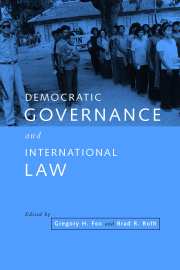Book contents
- Frontmatter
- Contents
- List of contributors
- List of acknowledgments
- Introduction: the spread of liberal democracy and its implications for international law
- PART I THE NORMATIVE FOUNDATIONS OF A RIGHT TO POLITICAL PARTICIPATION
- PART II DEMOCRACY AND INTER-STATE RELATIONS
- 4 Democratic legitimacy and the recognition of States and governments
- 5 Constitutionalism and democratic government in the inter-American system
- 6 Government networks: the heart of the liberal democratic order
- PART III DEMOCRACY AND THE USE OF FORCE
- PART IV DEMOCRATIZATION AND CONFLICTING IMPERATIVES
- PART V CRITICAL APPROACHES
- Index
5 - Constitutionalism and democratic government in the inter-American system
Published online by Cambridge University Press: 04 May 2010
- Frontmatter
- Contents
- List of contributors
- List of acknowledgments
- Introduction: the spread of liberal democracy and its implications for international law
- PART I THE NORMATIVE FOUNDATIONS OF A RIGHT TO POLITICAL PARTICIPATION
- PART II DEMOCRACY AND INTER-STATE RELATIONS
- 4 Democratic legitimacy and the recognition of States and governments
- 5 Constitutionalism and democratic government in the inter-American system
- 6 Government networks: the heart of the liberal democratic order
- PART III DEMOCRACY AND THE USE OF FORCE
- PART IV DEMOCRATIZATION AND CONFLICTING IMPERATIVES
- PART V CRITICAL APPROACHES
- Index
Summary
INTRODUCTION: THE OAS, DEMOCRACY, AND NON-INTERVENTION
Throughout its history, the Organization of American States (OAS) has grappled with a basic tension between protecting democracy and respecting the principle of non-intervention into other States' domestic affairs. Its failure to resolve this tension has generally undermined its role as a multilateral body. With the adoption of the “Santiago Commitment to Democracy and Renewal of the Inter-American System” in June 1991, the OAS took a decisive political step in favor of the protection of democracy over the principle of non-intervention. In essence, the OAS committed itself to respond to the “sudden or irregular interruption” of democracy in a member State.
The OAS's affirmation of democracy and human rights was far from new. The American Declaration of the Rights and Duties of Man (1948) and the American Convention on Human Rights (1978) both proclaim a wide range of rights. The OAS Charter has always recognized “the fundamental rights of the individual without distinction as to race, nationality, creed, or sex.” The OAS, moreover, has long been committed to representative democracy. Article xx of the American Declaration guarantees the right to participate in government and take part in “honest, periodic and free” elections with a secret ballot, as does Article 23 of the American Convention. Because Article 23 rights cannot be suspended even in time of public emergency, the American Convention implicitly condemns all coups.
- Type
- Chapter
- Information
- Democratic Governance and International Law , pp. 155 - 198Publisher: Cambridge University PressPrint publication year: 2000
- 5
- Cited by



